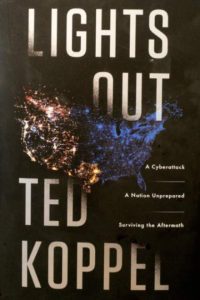Did you hear that hackers have developed a software program that may allow them to disable the US electrical grid?
According to last week’s Washington Post:
Hackers…have devised a cyberweapon that has the potential to be the most disruptive yet against electric systems that Americans depend on for daily life, according to U.S. researchers.
The malware, which researchers have dubbed CrashOverride, is known to have disrupted only one energy system — in Ukraine in December. In that incident, the hackers briefly shut down one-fifth of the electric power generated in Kiev.
Interfering with America’s electricity delivery would be disruptive to daily life, even if it only happened for a few hours. Hospitals would go on emergency power and the rest of us would, well, shiver (or sweat) in the dark for hours, days or longer, until power could be restored.
Except, of course, those of us who are prepared.
How You Can Prepare for a Big Blackout

So, I do think this latest story about hackers is worthy of concern. But I don’t think people should panic. Instead, Virginia homeowners should be aware of the threat and then take simple, common-sense steps to protect their homes from long blackouts.
This hacker malware is just another example of threats to the power grid that veteran Journalist Ted Koppel identified in his book Lights Out: A Cyberattack, A Nation Unprepared, Surviving the Aftermath. In the fall of last year, I did a piece about this book. Then, I shared Koppel’s warning, that it’s not a question of if America will be the target of a cyberattack on the electrical grid, but when. You can read the article here.
In that same article, I recommended another book that offers a solution: our friend Jeff Yago’s book Lights On: The Non-technical Guide to Battery Power When the Grid Goes Down.
Jeff goes beyond the usual tips about having flashlights with fresh batteries in different places around the house and in the car to offer advice on how to keep the most important things in your life up and running even in a blackout that lasts beyond a few days.
Jeff’s book teaches readers how to replace grid-powered devices with battery-powered appliances to cover every basic need of a modern household:
- Communication
- Lighting
- Refrigeration
- Pumping water
- Cooking
- Bathing
- Medical needs
Another Reason to Consider Solar + Storage
Usually, we recommend that homeowners who want solar plan to remain connected to the grid, if they already are. For cost reasons, it doesn’t make sense to disconnect from the grid and store all your power in batteries at home, because battery systems are still expensive. Installing enough batteries to cover your home’s power needs can double the price of installing solar. It’s hard to justify this expense for homeowners unless they live in an area with frequent blackouts or that’s located in a remote area off the grid.
But at some point in the future, we may change our mind about the grid vs. storage, even for homes that are already grid-tied.
On the one hand, batteries have gotten cheaper over the last few years at such a fast rate that they’ll soon be much more affordable for the average homeowner. On the other hand, the ability of hackers to disrupt the grid has gotten better and better. Meanwhile, the technology of the grid has continued to get older and older — and more and more vulnerable to attack.
For now, it’s probably good enough for most homeowners to take the steps to prepare that Jeff suggests in his book. But in the future, it might be time to start thinking about more serious measures to protect your home from grid failure and long blackouts.
In the meantime, getting solar that’s still connected to the grid but doesn’t yet have batteries is a good first step. For now, you’ll save money now by staying on the grid and you’ll earn money by being able to sell your extra solar power to your local utility. And you’ll also be ready to add batteries in the future.
As always, contact us for a free home solar assessment to see if solar is right for you. We’ll be happy to come by any location in southwestern and west-central Virginia.
— Andrew Brenner, Main Street Solar





